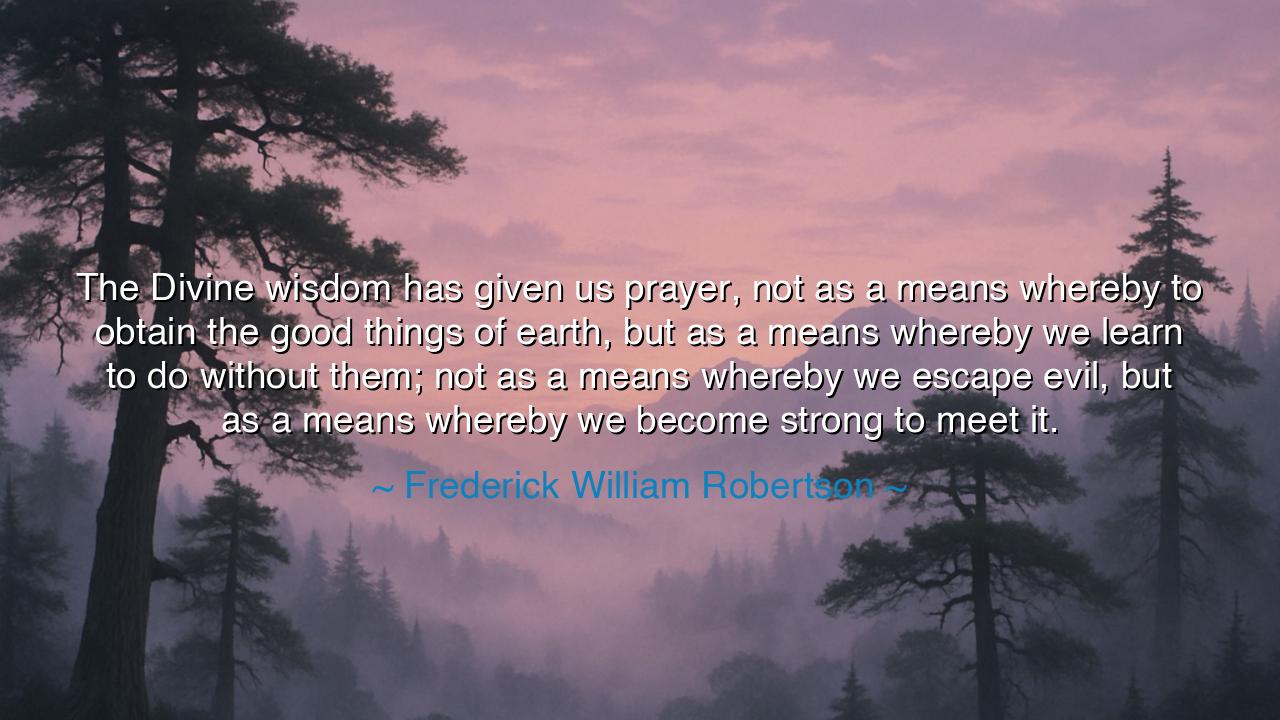
The Divine wisdom has given us prayer, not as a means whereby to
The Divine wisdom has given us prayer, not as a means whereby to obtain the good things of earth, but as a means whereby we learn to do without them; not as a means whereby we escape evil, but as a means whereby we become strong to meet it.






The preacher Frederick William Robertson unveiled a profound truth when he declared: “The Divine wisdom has given us prayer, not as a means whereby to obtain the good things of earth, but as a means whereby we learn to do without them; not as a means whereby we escape evil, but as a means whereby we become strong to meet it.” In these words, the veil is torn from the shallow notion of prayer as mere petition for comfort. Instead, he reveals it as the furnace of the soul, where weakness is burned away and true strength is forged.
The origin of this insight lies in the struggles of Robertson himself, a man of the nineteenth century, burdened with doubts, ill health, and sorrows that pressed upon him like a relentless tide. He found in prayer not a magic key to open the storehouses of worldly goods, but a ladder to climb above them. In his vision, Divine wisdom fashioned prayer as the discipline that teaches the heart to release its clinging to passing treasures, and to meet life’s storms not by flight but by endurance.
History gives us the radiant figure of Dietrich Bonhoeffer, the German pastor who stood against the terror of the Nazis. Imprisoned, stripped of freedom, and finally condemned to death, he did not find in prayer an escape from suffering, nor a sudden miracle to change his fate. Instead, prayer made him steadfast, calm, and resolute, so that he walked to the gallows with serenity. In him we see Robertson’s truth—that prayer is not given to remove evil from our path, but to give us the strength to walk through it without fear.
The ancients too knew this secret. The Stoics spoke of the discipline of the mind, and the Hebrews of the psalms that lifted the soul above its anguish. Prayer, in this vision, is the shaping of the spirit into harmony with the Divine, until no loss can break it and no pain can consume it. It does not abolish suffering, but transforms it into a teacher, and turns the soul into a fortress.
Therefore, O seekers, do not kneel before heaven as beggars clamoring for gifts of gold and bread. Kneel as warriors, seeking the steel of courage and the shield of endurance. Let your prayers not ask the storm to cease, but for the heart to stand unshaken within it. For the true gift of the Divine is not freedom from trial, but the strength to rise through it, purified, steadfast, and victorious.






NTnhung truong
I appreciate Robertson’s idea that prayer is not about gaining worldly things or escaping evil but about developing the strength to endure both. It makes me reflect on how we often approach challenges—seeking ways to avoid discomfort or hardship. But if prayer is truly meant to help us grow stronger in the face of adversity, does that mean we should be seeking more difficult situations in order to build strength? How can we apply this mindset to everyday struggles?
AAkayana
This quote seems to redefine the purpose of prayer in a way that focuses more on personal growth than external change. If prayer helps us to be strong in the face of adversity rather than escape it, how does that affect our approach to hardship? I wonder if people often pray with the expectation of relief from suffering, but this perspective encourages a deeper form of spiritual maturity—learning to endure and even grow through challenges. Do we really see prayer in this light?
UUyen
I find this perspective on prayer both humbling and thought-provoking. Robertson’s take suggests that prayer is not about asking for help or relief, but about strengthening our resilience. It makes me wonder—could prayer be less about seeking change in our circumstances and more about transforming ourselves to better handle what comes our way? Is it possible that by focusing on inner strength, we become better equipped to face life’s difficulties rather than avoid them?
GDGold D.dragon
This quote really challenges the way we often think about prayer. Most of us tend to see prayer as a way to ask for help, whether it’s for material blessings or protection from harm. But Robertson flips that view, suggesting that prayer is more about cultivating inner strength and learning to live without the things we often think we need. Does this mean we should approach prayer with a mindset of detachment from worldly desires? How does this idea affect the way we view life’s challenges?